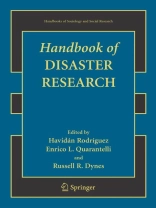This timely Handbook is based on the principle that disasters are social constructions and focuses on social science disaster research. It provides an interdisciplinary approach to disasters with theoretical, methodological, and practical applications. Attention is given to conceptual issues dealing with the concept ‘disaster’ and to methodological issues relating to research on disasters. These include Geographic Information Systems as a useful research tool and its implications for future research. This seminal work is the first interdisciplinary collection of disaster research as it stands now while outlining how the field will continue to grow.
Cuprins
What Is a Disaster?.- A Heuristic Approach to Future Disasters and Crises: New, Old, and In-Between Types.- The Crisis Approach.- Methodological Issues.- The Role of Geographic Information Systems/Remote Sensing in Disaster Management.- Morbidity and Mortality Associated with Disasters.- Race, Class, Ethnicity, and Disaster Vulnerability.- Gender and Disaster: Foundations and Directions.- Globalization and Localization: An Economic Approach.- Local Emergency Management Organizations.- Community Processes: Warning and Evacuation.- Search and Rescue Activities in Disasters.- Community Processes: Coordination.- Sustainable Disaster Recovery: Operationalizing An Existing Agenda.- Sheltering and Housing Recovery Following Disaster*.- Businesses and Disasters: Vulnerability, Impacts, and Recovery.- Organizational Adaptation to Disaster.- Community Innovation and Disasters.- Disaster and Development Research and Practice: A Necessary Eclecticism?.- National Planning and Response: National Systems.- Disaster and Crisis Management in Transitional Societies: Commonalities and Peculiarities.- Terrorism as Disaster.- Recent Developments in U.S. Homeland Security Policies and Their Implications for the Management of Extreme Events.- Unwelcome Irritant or Useful Ally? The Mass Media in Emergencies.- The Popular Culture of Disaster: Exploring a New Dimension of Disaster Research.- Remembering: Community Commemoration After Disaster.- Research Applications in the Classroom.- From Research to Praxis: The Relevance of Disaster Research for Emergency Management.- Communicating Risk and Uncertainty: Science, Technology, and Disasters at the Crossroads.- Crisis Management in the Twenty-First Century: “Unthinkable” Events in “Inconceivable” Contexts.- New Dimensions: The Growth of a Market in Fear.- Disasters Ever More? Reducing U.S. Vulnerabilities.












